Cold weather RVing has its challenges. These can be minimized if you follow a few packing tips as you prepare to leave for your outing. Advance preparation will help to ensure the best possible experience if you believe there is potential for cold or even freezing weather.
First consider what you will need for the exterior care of your camper or coach.
- Check the forecast predicted for the area you plan to visit on television or online for the most up-to-date information.
- Bring an interior/exterior thermometer and place the exterior sensor in one of the storage bays of your coach or camper.
- Pickup a Diesel Fuel Supplement and add it to your coach’s fuel tank. Run the engine and the generator to circulate it through both to prevent your diesel fuel from jelling BEFORE you encounter freezing weather.
- Next add some RV non-toxic, biodegradable antifreeze to your holding tanks via your toilet and shower drain to keep the tank water from freezing. (Note: add more antifreeze as you use water so the antifreeze does not become too diluted and drain these tanks when they become two thirds full.)
- Fill your LP Tank before leaving and monitor its supply during your trip to ensure your furnace will work if you are not plugged into a working electrical supply.
- Pick up some heat tape suitable for the types of water lines or water hoses in your camper or RV along with a small thermostatically controlled ceramic heater or tank heating pads. These will help to keep your water lines and storage bay warm enough to ensure the water systems will continue to flow. But only if you plan your stay where electricity is available (unless you don’t intend to use these water based systems because you have winterized your RV.)
- Add winter formula wiper fluid to your coach and tow vehicle. Have a shovel, de-icing fluid, a windshield scraper, tire chains and exterior roof vent covers with you if you expect to encounter ice or snow.
The interior cold weather packing tips are a bit easier.
- Again, consider a thermostatically controlled ceramic heater to lessen your use of propane and reduce humidity in your coach.
- Make sure you have Smoke, LP and Carbon Monoxide detectors installed with fresh batteries in all of them. A good ABC fire extinguisher recently purchased is a must.
- Fill your ceiling vents with the 14”x14” ceiling vent pillows made for that purpose to keep warm air from escaping and lessen condensation inside of your RV. Supplement those with a few containers of Damp Rid to collect moisture.
- Using less propane to reduce humidity inside the camper can be achieved with an induction cooking plate and electric griddle both of which are available at Camping World.
Lastly, don’t forget warm clothes, pajamas, socks, house shoes or slippers, sweaters, jackets, boots, mittens and hats. Consider sleeping bags, an electric blanket or down comforter and flannel sheets. Add your snow toys like skis, snow shoes, snow boards and a camera and you are ready to roll for a cold weather camping trip you will enjoy.

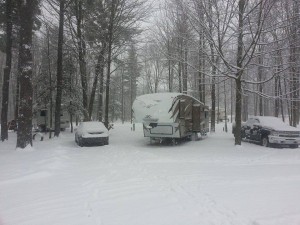

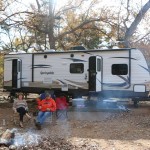
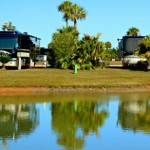
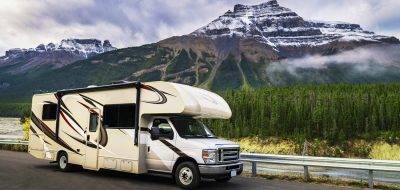

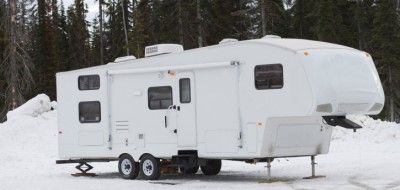

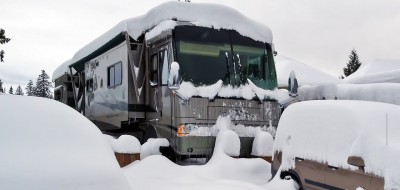
Anonymous
Our propane system fails consistently when temperatures hit about freezing. We have had service by Camping World and by the coach manufacturer in Canada. We have replaced regulators without success. I had the rig in Canada for other work in early spring. I told them about my propane failure problem. They checked propane system and replaced regulators just in case. Driving home that night I was plugged in through a bad, freezing, storm. Once again, the propane failed- no furnace, no rangetop. I immediately drove back to Canada and the manufacturer. They patiently rechecked everything. They suggested that there was too much butane in our local propane. The liquification point of butane is 32 degrees. When the temperature hits 32 all the butane turns from gas to liquid with a resulting loss in system pressure. How can I be sure I am getting propane without butane? Or maybe I should be rigging a propane tank heater.